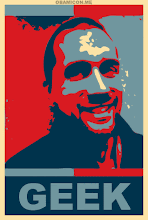From Bill's bio: Bill Tancer is the world's preeminent expert on online behavior. He is general manager of global research at Hitwise, the world's leading online competitive intelligence services company. He is widely quotede on the latest Internet trends. He appears as a frequent guest on CNBC and has been quoted in major print and online media. Bill writes a weekly column for Time magazine called "The Science of Search".
(Bill won his science camp talent show by reciting Pi to 200 digits...I like this guy already)
It all started with a junk email from Time.com, that Bill almost deleted, asking if he wanted to write a column. Instead of deleting it, Bill replied to it "sure". Lesson one = check your junk email!
Mystery Searches, Prom Dresses, and the Ultimatum Theory
Bill showed an example of data collected by Hitwise - 1/1 to 1/5 had the most search traffic, annually, for diets than any other time during the year. The lowest, conversely, was in and around Thanksgiving. This trend exists year after year.
The most popular retail search is for Prom Dresses and, again, the real spike occurs in early January. The problem with this, though, was that retail stores began marketing their dresses in March. The disconnect was clear. Hitwise aided the industry by providing the data and, essentially, expanded their sales period of prom dresses from March - May to January - May, doubling their annual sales. Awesome use of the data!
Prom dresses aside, engagement ring sales, in brick and mortar, spiked the week after Thanksgiving. Bill's data showed it was actually the week before Thanksgiving (for what reason {"I'm not going home empty handed"} he's not sure), but, again, HitWise data was pointing out an inefficiency in the marketplace.
Women Wrestlers, Economic Predicitons, and The Narrative Fallacy
Dancing with the Stars is a popularity contest...and, therefore, searches on the stars could, essentially, predict who was going to win...or so Bill thought. Stacey Keibler came in as the most searched, Drew Lachey and Jerry Rice second and third. But Stacey didn't win...what happened? What was the intent of the search? Five words - Hot Pictures of Stacey Keibler...perhaps the 'searchers' weren't really Dancing with the Stars fans...
You have to go beyond the search term and look at the actual intent of the search - and, thus, The Stacey Keibler Correction Coefficient was formed. Intent as well as content...Other areas of application included unemployment filing and home sales. Not nearly as interesting as women wrestlers, though...
Cognitive Dissonance and the Adult Entertainment Industry
Cognitive Dissonance means to answer a question posed to you in the best possible light. Observed behavior doesn't contain CD, but how you sayyou behave differs from how you actually behave. Bill asked the audience how many people frequent adult entertainment sites, and nobody raised their hand. Would this not, then, dictate that the internet is porn free? Of course, we know different...(not from personal experience, mind you)
Somebody's not telling the truth...this is one of the most extreme examples of CD. Narrative Fallacy was also covered, referring to when you sample a large amount of data, it's very easy to look through the data and filter out, if you will, the data that suits your needs best. The remaining data is left by the wayside...
An example of Narrative Fallacy - The CEO of Estee Lauder said that as times got tough, sales of more affordable luxuries (in this case lipstick) go up. HitWire study of this trend just happened to coincide with the Stock Market crash. The study showed that while sales of lipstick went up, it was more to do with the "Lipstick on a Pitbull" comment than the 'affordable luxury' concept.
Is eLearning Recession-Proof?
As the economy has been going down, users are stepping away from online commerce and focusing more on online education...a form of 'self-betterment'. Interest in eLearning went way up as the economy went way down. An interesting trend with this data - Individuals in the higher income brackets showed the greatest increase in visits (going from about 9% to about 13%), whereas it actually dropped in lower income brackets.
Summary/Conclusion
- Observed behavior provides unique insight into changing consumer sentiment.
- eLearning, both from the perspective of insitutions and platforms, is moving opposite of the economy.
Great presentation, overall. The fact that eLearning is going in the opposite direction of the economy is a great sign for those of us in this industry. What's more, this might actually be able to drive more for us, whereas other departments are going through cutbacks. This data will definitelybe used when I get back...hopefully for some Captivate 4 love!
Thursday, March 12, 2009
Subscribe to:
Post Comments (Atom)


No comments:
Post a Comment